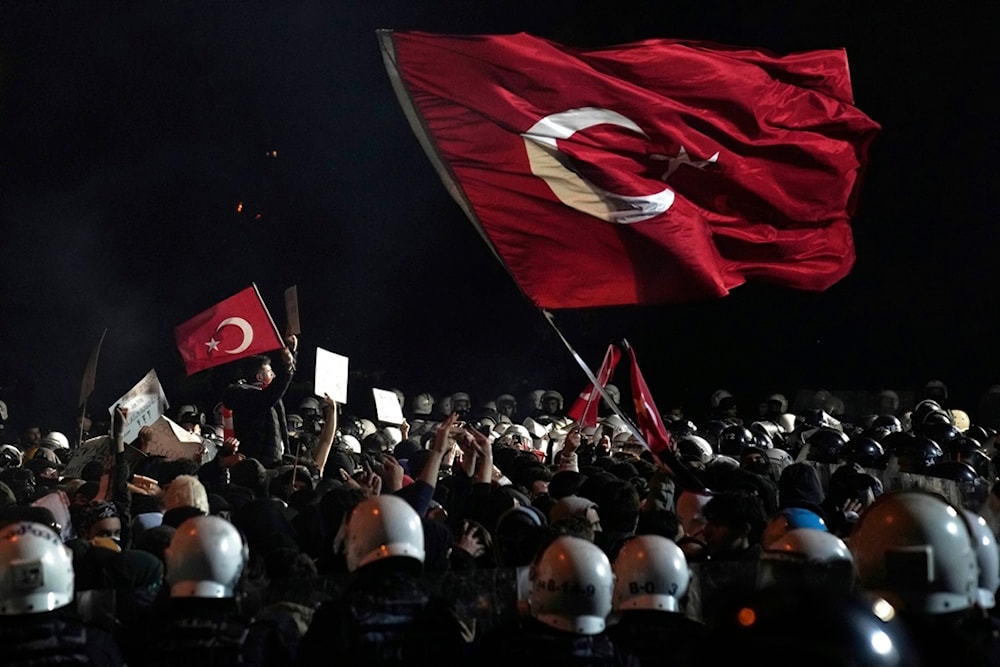EU faces dilemma between supporting and condemning Turkiye: Politico
Turkiye benefits from trade flows with the EU exceeding €200 billion annually, while its strategic position has become even more significant since the start of the war in Ukraine in 2022.
-
 People shout slogans next to anti-riot police officers in Istanbul, Turkey, Monday, March 24, 2025, during a protest after Istanbul's Mayor Ekrem Imamoglu was arrested and sent to prison (AP Photo/Khalil Hamra)
People shout slogans next to anti-riot police officers in Istanbul, Turkey, Monday, March 24, 2025, during a protest after Istanbul's Mayor Ekrem Imamoglu was arrested and sent to prison (AP Photo/Khalil Hamra)
Despite its warnings to Turkiye, the European Union will continue to send billions of euros to Ankara amid Erdogan's repression of political opponents.
Turkiye's status as an EU candidate requires it to "uphold democratic values" and Brussels will respond to any violations, two European officials told Politico on condition of anonymity about closed-door discussions.
One of the European officials stated that the EU is following the events unfolding in Turkiye "with great concern", emphasizing that "the latest developments go against the very logic of EU accession," as the country continues to lock the president's political opposition behind bars.
The other official, however, told Politico that Turkiye's importance to the bloc in migration, trade, energy, and defense means that any measures that would strain the relations between Brussels and Ankara would be unlikely.
Turkiye, now a crucial hub for oil and gas exports, benefits from trade flows with the EU exceeding €200 billion annually, while its strategic position has become even more significant since the start of the war in Ukraine in 2022.
Ankara plays a key role in controlling access to the Black Sea and enforcing sanctions against Moscow, with recent discussions also positioning it as a major contributor to any potential peacekeeping mission in Ukraine.
Dimitar Bechev, a lecturer at the University of Oxford, stated that whatever the Turkish leader does, the EU will have no choice but to follow, adding that “the status quo before Imamoglu’s arrest was comfortable for the EU because there was just enough democracy." Bechev emphasized that the current situation is not "grave enough" for any tough measures.
Turkiye applied to join the EU in 1999, and despite negotiations stalling over the past decade, the country continues to receive billions in accession funds.
Additionally, Ankara has been granted around €9 billion in aid to host refugees from the Middle East, and it is set to receive significant financial support for European defense industries, highlighting the substantial sums of money Turkiye benefits from the EU.
As an EU candidate country, Turkiye has the potential to access joint procurements worth €800 billion from funds aimed at boosting the bloc's defense spending, though Greece and Cyprus, both involved in long-running conflicts with Turkiye, are advocating for restrictions.
Despite this, Ankara doubts the EU will support the two countries' objections, as its defense capabilities remain essential to Europe, with former Turkish ambassador to the EU, Selim Yenel, stating that if Europeans “want Turkish participation in certain areas — for example, sending troops to Ukraine in the future — then they will have to give access to Turkey.”
Yenel said that despite the dire situation in his country, he predicted that “since it seems that the EU needs Turkiye, they will not put pressure on us.”
These circumstances are forcing Greece and Cyprus to take a balanced approach to Ankara, balancing between enforcing pressure by condemning the latest political developments while continuing the process of normalizing ties with Turkiye.
“We will, of course, support a rigorous position condemning the current developments in Turkey, but without being the trigger,” one Greek official said, according to Politico, adding that “The defense industry remains a big gap for Europe, and this paves the way for this trade-off policy that we see taking place.”
Meanwhile, Cypriot MEP Michalis Hadjipantela called for "targeted sanctions" on Turkiye, while emphasizing that “measures should be targeted and linked to progress on the above issues in order to avoid further alienating the country, which would lead to more provocative policies.”

 4 Min Read
4 Min Read








